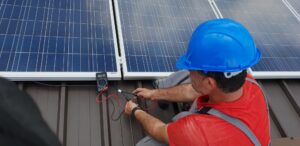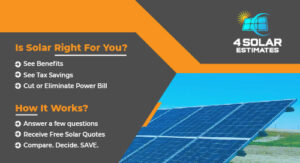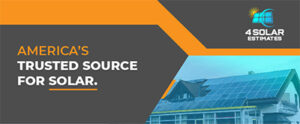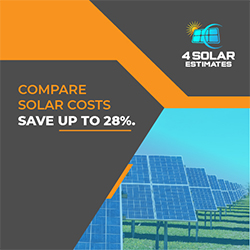
A Comprehensive Guide to Solar Panel Installation and Maintenance
Solar energy is gaining popularity as an eco-friendly and cost-effective alternative to traditional energy sources. As a result, more and more homeowners are considering solar panel installations to power their homes and reduce their carbon footprint. In this comprehensive guide, we will walk you through the key steps involved in solar panel installation and maintenance, ensuring you have all the information you need to make an informed decision about embracing solar energy.
COMPARE SOLAR QUOTESUnderstanding Solar Panel Basics
Before diving into the installation process, it’s essential to understand the basic components and functionality of a solar panel system. Solar panels are made up of photovoltaic (PV) cells that convert sunlight into direct current (DC) electricity. An inverter then converts the DC electricity into alternating current (AC) electricity, which can be used to power your home. Excess electricity generated by your solar panels can be sent back to the grid or stored in a solar battery for later use.
Assessing Your Home’s Solar Potential
Before installing solar panels, it’s crucial to assess your home’s solar potential to determine if solar power is a viable option for you. Factors to consider include:
- Roof size and orientation: Your roof should be large enough to accommodate the desired number of solar panels and should ideally face south to maximize sun exposure.
- Roof condition: Your roof should be in good condition, as solar panels have a lifespan of 25-30 years, and it’s more cost-effective to replace an aging roof before installing solar panels.
- Shading: Excessive shading from trees or nearby structures can negatively impact the efficiency of your solar panels.

Selecting the Right Solar Panel System
There are several types of solar panel systems available, and it’s essential to choose the one that best suits your needs and budget. Consider factors such as your energy consumption, the available space for solar panels, and your desired level of grid independence. Some popular solar panel systems include:
- Grid-tied solar systems: These systems are connected to the electrical grid, allowing you to draw power from the grid when your solar panels aren’t producing enough electricity.
- Off-grid solar systems: These systems are entirely independent of the electrical grid and rely on solar batteries to store excess electricity for use during times of low sun exposure.
- Hybrid solar systems: These systems combine the benefits of grid-tied and off-grid systems, connecting to the grid while also utilizing solar batteries for energy storage.
Hiring a Professional Installer
Solar panel installation is a complex process that requires specialized knowledge and skills. It’s crucial to hire a professional installer with experience in solar panel systems to ensure a safe and efficient installation. Look for reputable companies with positive reviews, proper licensing, and a proven track record of success. Obtain multiple quotes to compare pricing and services before making your decision.
COMPARE SOLAR QUOTESNavigating Incentives and Rebates
Many local, state, and federal incentives and rebates are available to help offset the cost of solar panel installation. Research available programs in your area, and be sure to ask your installer about potential incentives. By taking advantage of these programs, you can significantly reduce the cost of your solar panel system and enjoy a faster return on investment.

Solar Panel Maintenance Tips
To ensure the longevity and efficiency of your solar panel system, it’s essential to perform regular maintenance. Here are some tips to keep your solar panels in top shape:
- Keep your solar panels clean: Dust, dirt, and debris can reduce the efficiency of your solar panels. Periodically clean the panels with a soft brush or hire a professional cleaning service.
- Monitor your system’s performance: Keep an eye on your solar panel system’s output to detect any potential issues or drops in efficiency.
- Schedule regular inspections: Have a professional inspect your solar panel system annually or as recommended by the manufacturer to ensure optimal performance and address any potential issues.
Three Main Types of Solar Panels
As you consider solar panel installation for your home, it’s essential to understand the three main types of solar panels available on the market. Each type of solar panel has its own unique set of advantages and disadvantages, making it crucial to choose the one that best suits your needs and preferences.
Monocrystalline Solar Panels
Monocrystalline solar panels are made from a single crystal structure, giving them a uniform, dark appearance. These panels offer the highest efficiency rates among the three types, typically ranging between 18-22%. Monocrystalline panels require less space to achieve the same power output as other panel types, making them an ideal choice for homeowners with limited roof space. However, they also tend to be more expensive than other options due to their higher efficiency and the more complex manufacturing process.
COMPARE SOLAR QUOTESPolycrystalline Solar Panels
Polycrystalline solar panels are made from multiple crystal structures, resulting in a more fragmented, blueish appearance. These panels have slightly lower efficiency rates compared to monocrystalline panels, usually ranging from 15-17%. Polycrystalline panels are generally more affordable than monocrystalline panels, making them a popular choice for homeowners seeking a cost-effective solar solution. However, they require more space to achieve the same power output as monocrystalline panels, which may be a consideration for homeowners with limited roof space.
Thin-Film Solar Panels
Thin-film solar panels are made by applying a thin layer of photovoltaic material onto a substrate, such as glass or metal. These panels have the lowest efficiency rates of the three types, typically ranging from 10-12%. Thin-film panels are lightweight and flexible, making them an attractive option for unique architectural applications or situations where the weight of traditional panels may be a concern. They are also generally the most affordable option. However, due to their lower efficiency, they require significantly more space to achieve the same power output as monocrystalline or polycrystalline panels.

The Average Cost of Solar Panels
The cost of solar panels can vary widely depending on factors such as the size of the system, the type of panels, and the complexity of the installation. On average, the cost of solar panels ranges from $15,000 to $25,000, including installation. However, it’s essential to note that available incentives and rebates can significantly reduce upfront costs. Here’s a breakdown of some average costs to give you a better understanding of solar panel pricing:
- Small residential solar panel system (3-4 kW): $9,000 – $16,000, including installation
- Medium residential solar panel system (5-6 kW): $15,000 – $25,000, including installation
- Large residential solar panel system (7-8 kW): $21,000 – $32,000, including installation
Keep in mind that these are average costs, and the actual price of your solar panel installation may vary based on factors such as regional labor rates, the specific solar panel brand and model, and any additional equipment or customizations.
When considering the cost of solar panels, it’s essential to factor in the long-term savings on your energy bills. Many homeowners find that their solar panel systems pay for themselves within 5-10 years due to the reduction in energy expenses. Additionally, solar panels can increase your home’s value, making them a worthwhile investment in the long run.
Solar panel installation can be a rewarding and cost-effective way to power your home while reducing your carbon footprint. By understanding the various aspects of solar panel systems, assessing your home’s solar potential, choosing the right system, and maintaining your panels properly, you can enjoy the many benefits of solar energy. With proper research and planning, you can confidently embark on your solar panel journey and enjoy a more sustainable and energy-efficient home.
COMPARE SOLAR QUOTES
Leave a Reply